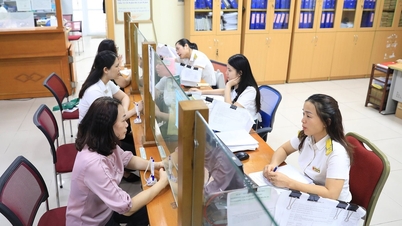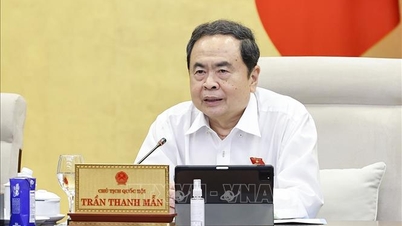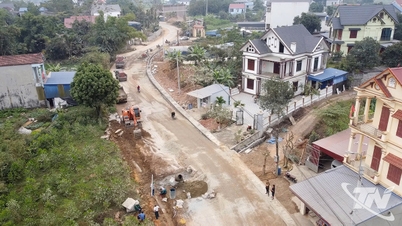This was noteworthy information at the seminar "Promoting voluntary compliance and full tax contributions – building a prosperous era" organized by the Lao Dong Newspaper in coordination with the Tax Department ( Ministry of Finance ) and VCCI on the afternoon of October 23rd.

Individual business owners still face many obstacles in tax declaration.
According to the Tax Department, in the first nine months of 2025, more than 18,500 businesses paying flat-rate taxes switched to the declaration method, nearly 2,530 businesses transitioned to the corporate model, and 98% of businesses paying taxes electronically have implemented tax declaration and payment. Over 133,000 businesses have registered to use electronic invoices, a crucial preparatory step for the elimination of flat-rate taxes from January 1, 2026.
The figures above show positive progress, but for this process to be sustainable, many difficulties remain. Feedback from the grassroots level indicates that the individual business sector, especially in the food and beverage, service, and online business sectors, still faces the most challenges in improving voluntary compliance.

The majority of household businesses are run by elderly people, are small-scale, have little habit of keeping records, and are wary of administrative procedures, especially electronic ones. Many worry that transparent revenue reporting means their entire operations will be "seen," making them more susceptible to inspections.
Furthermore, the habit of "not requesting receipts" among consumers also discourages businesses from issuing invoices as required by regulations. In addition, a small segment of businesses still intentionally violate the rules, such as making false declarations, evading taxes, buying and selling invoices, or colluding in fraudulent activities.
Promoting voluntary compliance through digital transformation and risk management.

Experts at the workshop agreed that the key direction the tax sector should focus on is perfecting policies to ensure transparency, simplicity, and modernization of tax administration.
Mr. Mac Quoc Anh, a member of the Central Committee of the Vietnam Fatherland Front, pointed out three types of costs that small businesses are paying: psychological costs (fear of violating regulations), opportunity costs (waiting time and lost cash flow), and information costs (inconsistency in interpretation and guidance among agencies).
A survey by the Hanoi Association of Small and Medium Enterprises (SMEs) shows that over 65% of informal businesses admit to "not having enough knowledge to declare correctly." Meanwhile, 90% of those transitioning to formal businesses acknowledge that "fear of violating tax regulations" is the biggest obstacle. Vietnam currently has an average annual tax compliance cost of 10-15 million VND per small business, including the cost of hiring support services. Based on this reality, Mr. Mac Quoc Anh argues that tax management needs to shift from "management and control" to "partnership and service."
Concurring, Mr. Phan Duc Hieu, a member of the National Assembly's Economic and Financial Committee, also stated that to improve tax compliance, policies must be clear, procedures simplified, and management must shift from process to objective. In particular, digital transformation requires a change in governance mindset; public authorities need to proactively support citizens; and mechanisms are needed to encourage those with a history of good compliance, clearly distinguishing them from violators to foster a spirit of self-awareness.
Meanwhile, Ms. Bui Thi Trang, Director of Retail Solutions at MISA Joint Stock Company, believes that technology is key to helping business households comply with taxes more easily.
"It's crucial for business owners to clearly understand what they need to do, to make it easy to implement, and to see the benefits of doing it right. Furthermore, data integration and automation help business owners reduce the risk of errors, avoid forgetting tax obligations, and feel that compliance becomes easier," Ms. Trang shared.

Drawing on Japan's experience, Mr. Noguchi Daisuke, Chief Advisor of the JICA Tax Project (Japan), stated that "trust is the decisive factor in maintaining voluntary compliance." Japan has succeeded by combining tax education, process transparency, and the development of a network of tax advisors to support taxpayers.
He argued that Vietnam is on the right track with tools like electronic invoices and e-Tax Mobile, but needs more support for small businesses, helping them maintain confidence when encountering difficulties. This is also the foundation for Vietnam to move closer to a modern, transparent, and fair tax system.
Mr. Bui Ngoc Tuan, Deputy General Director of Tax & Legal Consulting Services at Deloitte Vietnam: The transition of over 18,000 business households to tax declaration in a short period of time demonstrates the spirit of cooperation and readiness for change in the individual economic sector. However, for this change to truly spread, sustained support from management agencies, consulting organizations, and technology companies is needed. The challenge is not just about tightening management, but more importantly, building trust and creating a fair environment where compliant individuals see the benefits and violators cannot evade them. When business households feel that tax declaration, invoicing, and bookkeeping are easy and fair, voluntary compliance will become a habit, not a mandatory obligation.
Mr. Mai Son, Deputy Director of the Tax Department, Ministry of Finance: The tax sector is strongly shifting towards a system where "citizens know, understand, and agree" with tax policies, because simply using slogans will not lead to understanding. The tax sector has undergone four major reform phases, moving towards data-driven management. Accordingly, the tax data system is interconnected with banks, insurance companies, customs, industry and trade, and natural resources and environment agencies to cross-reference and suggest tax declarations, reduce errors and compliance costs; blockchain and artificial intelligence (AI) are being applied in the next-generation management system, aiming for implementation from 2026.
The goal is to use big data to analyze risks, detect fraud, and proactively support taxpayers. The aim is to reduce administrative costs by 44%, exceeding the general target of 30%. This is both a commitment and a desire to build a friendly, transparent, and efficient tax environment, contributing positively to national development and ensuring social welfare.
Source: https://hanoimoi.vn/ho-kinh-doanh-ca-the-mat-xich-nhieu-thach-thuc-trong-hanh-trinh-nang-cao-tuan-thu-thue-720680.html







![[Podcast] National Assembly approves personal allowance deduction of VND 15.5 million/month](https://vphoto.vietnam.vn/thumb/402x226/vietnam/resource/IMAGE/2025/12/10/1765340032834_hnm-1cdn-vn-thumbs-540x360-2025-11-04-_hnm-1cdn-vn-thumbs-540x360-2025-06-27-a7b22b8722-_thu.jpeg)




























![[Photo] Prime Minister Pham Minh Chinh holds a phone call with the CEO of Russia's Rosatom Corporation.](/_next/image?url=https%3A%2F%2Fvphoto.vietnam.vn%2Fthumb%2F1200x675%2Fvietnam%2Fresource%2FIMAGE%2F2025%2F12%2F11%2F1765464552365_dsc-5295-jpg.webp&w=3840&q=75)




































































Comment (0)